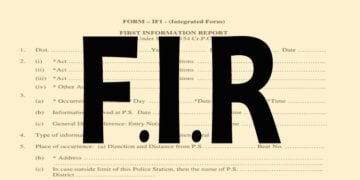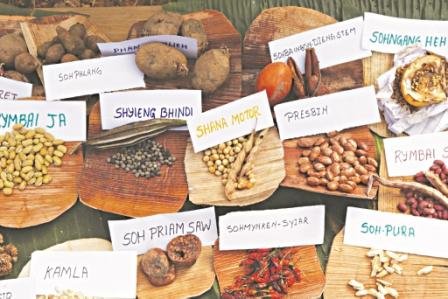The North East Slow Food and Agrobiodiversity Society (NESFAS) along with the Umsawwar Youth Club organized a community seed fair at Madan Football Nonglum, Umsawwar under Mawkynrew C&RD Block today.
The fair is an initiative of the Rural Electrification Corporation Foundation (REC)-funded project, ‘No One Shall Be Left Behind Initiative’ which aims to connect farmers and help pave a way for them to showcase and exchange seeds from their respective communities. Seed fairs are one of the many opportunities for farmers from different communities to gather and discuss not only seeds but also exchange knowledge about their local practices.
Nine communities participated in the fair namely Rapleng, Pashang, Nohron, Rasong, Jongksha, Mawpynthymmai, Pyngkya, Khapmaw, and Lamsaiñ (Mawkynrew C&RD Block, East Khasi Hills). They each showcased several indigenous seeds– rice bean variety, millet, perilla, black sesame, local fruits, Flemingiavestita, potato variety, and more– that have been saved by their ancestors of some community members, foraged from the nearby forests and harvested by custodian farmers of the communities.
Dr. Das Atel, Medical Officer of PHC Jatah and chief guest on the occasion, said, “Implementation of indigenous foods and systems is very important as it is more likely to help in achieving sustainability and not rely on external markets for food. Regarding agrobiodiversity, we have to understand nutrition and nutrition can be achieved by the community a proper balanced nutritional diet can help us avoid a lot of diseases.” He added, “It will help young children and pregnant mothers to combat diseases. I thank NESFAS for their intervention in this community and for upholding these nutrition campaigns.”
Headman of Umsawwar, SephrinNongrum lauded NESFAS and the youth club for their commendable work. “NESFAS has always encouraged the farmers to preserve indigenous seeds and instilled knowledge on how these seeds have a lot of nutritious values. Our community members are now aware of how important it is to grown chemical-free vegetables and fruits and also consume the produce and wild edibles that we get from foraging the forests.”
The NESFAS team also held a workshop on seeds and soil after the formal programme.
Gratia Dkhar, Lead Associate at NESFAS along with Armsterwell Kharbuki, Agroecology Consultant at NESFAS conducted the workshop at the venue. The workshop is intended to help preserve local seeds by harvesting seeds that are found in the region and enhance the development of chemical-free cultivation. They also spoke about the difference between hybrid and organic seeds.
“It is very important to keep a tab on the soil’s health and one should take care of their topsoil. Farmers should practice terrace farming more for the longevity of the soil,” Gratia said, during the session.
Executive Director of NESFAS Pius Ranee, while addressing the community members said, “Preserving our food systems and consuming local foods that are chemical-free should be our utmost priority and I am glad that communities here are doing so. Seeds preservation and seed banks are very important as this will bring about a change in the farming systems and will help us in maintaining a healthy lifestyle.”
























